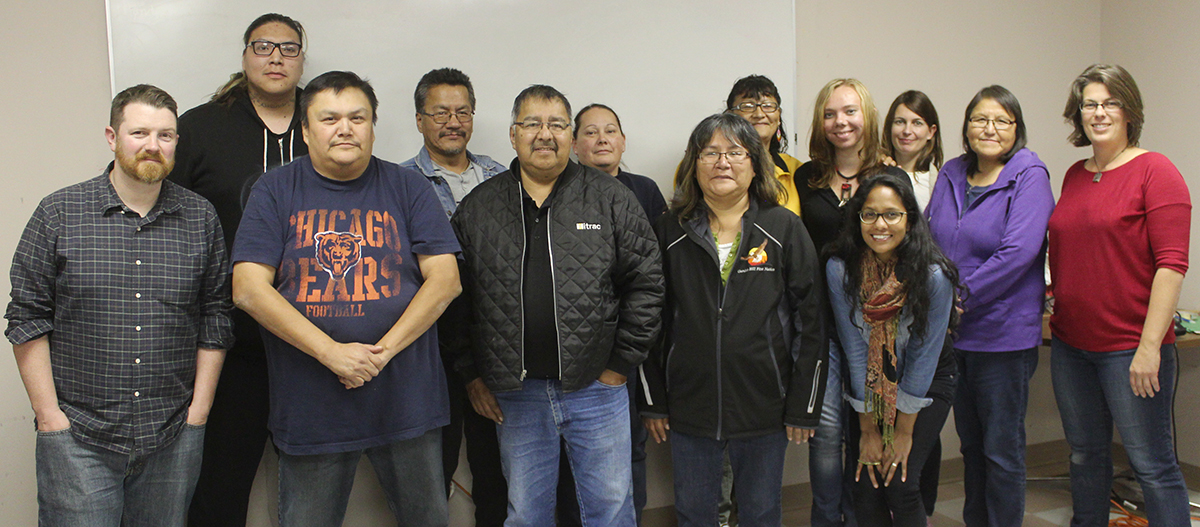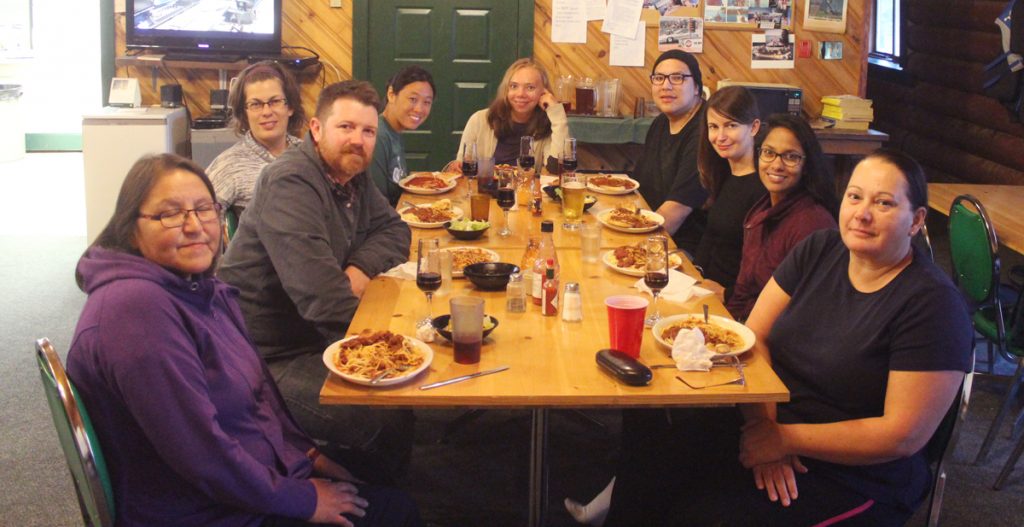
In the spirit of World Food Day, we share a guest blog that Andi Sharma wrote about her recent trip to Garden Hill, a fly-in community in Northern Manitoba tackling their food security challenges with exciting community-led solutions.
Sharma (of the Northern Healthy Foods Initiative, Manitoba Aboriginal and Northern Affairs) is one participant in the collaborative Northern Manitoba Food, Culture, and Community Fund (NMFCCF) at Tides Canada. The Fund is led by a group of funders and northern advisors who work together to manage its grantmaking and provide strategic direction.
Each year, the collaborative travels to connect with communities participating in the Fund. This year’s trip was to Garden Hill, where Sharma was joined by northern advisors from Poplar River First Nation and Leaf Rapids, and funders and supporters from J.W. McConnell Family Foundation, Canadian Centre for Policy Alternatives, and Tides Canada. These trips are an important part of the Fund’s unique approach to philanthropy—communities, funders, and advisors can benefit from shared learning on trips, ultimately resulting in better understanding, program delivery, and mutual inspiration for all involved.
My first thoughts upon entering the community started way up in the tiny plane as we approached the runway. The sheer vastness of Island Lake, with its bounty of small islands dotting the surface, unfolded beneath the plane as we came in for the landing. It struck me then that the stunning beauty of such remote isolation—the pristine waters, the seemingly endless boreal forest and all of the abundant wildlife that comes with these traditional, largely untouched lands—was at once the root of the problem and a pathway out of poverty for this community.
 First stop on the trip was the Northern Store. It was an opportunity for the group to assess the costs of fresh food in the north and provide context for the food security work of the collaborative. I am quite familiar with the exorbitant food prices in northern Manitoba but even I was taken aback by a few of the prices. When you consider that sometimes 80% of a northern community can be on social assistance; and also consider that the daily food/personal item allotments for northern assistance in Manitoba amounts to approximately $16/day for a single mother of one; it seems a daunting task to feed a family on healthy foods when it’s $8.50 for a bunch of bananas, over $12 for 4 vine-ripened tomatoes and sometimes over $100 for 24-pack of drinking water at the Northern Store. This daily allowance also needs to cover much needed purchases such as diapers, so there are clearly tough decisions being made at the family level because of these prices. The NMFCCF acknowledges the importance of industry in the north and hopes to help with the long journey to self-sufficiency by empowering communities to localize food systems through enterprise in order to avoid unjust pricing practices while simultaneously creating economic opportunity.
First stop on the trip was the Northern Store. It was an opportunity for the group to assess the costs of fresh food in the north and provide context for the food security work of the collaborative. I am quite familiar with the exorbitant food prices in northern Manitoba but even I was taken aback by a few of the prices. When you consider that sometimes 80% of a northern community can be on social assistance; and also consider that the daily food/personal item allotments for northern assistance in Manitoba amounts to approximately $16/day for a single mother of one; it seems a daunting task to feed a family on healthy foods when it’s $8.50 for a bunch of bananas, over $12 for 4 vine-ripened tomatoes and sometimes over $100 for 24-pack of drinking water at the Northern Store. This daily allowance also needs to cover much needed purchases such as diapers, so there are clearly tough decisions being made at the family level because of these prices. The NMFCCF acknowledges the importance of industry in the north and hopes to help with the long journey to self-sufficiency by empowering communities to localize food systems through enterprise in order to avoid unjust pricing practices while simultaneously creating economic opportunity.
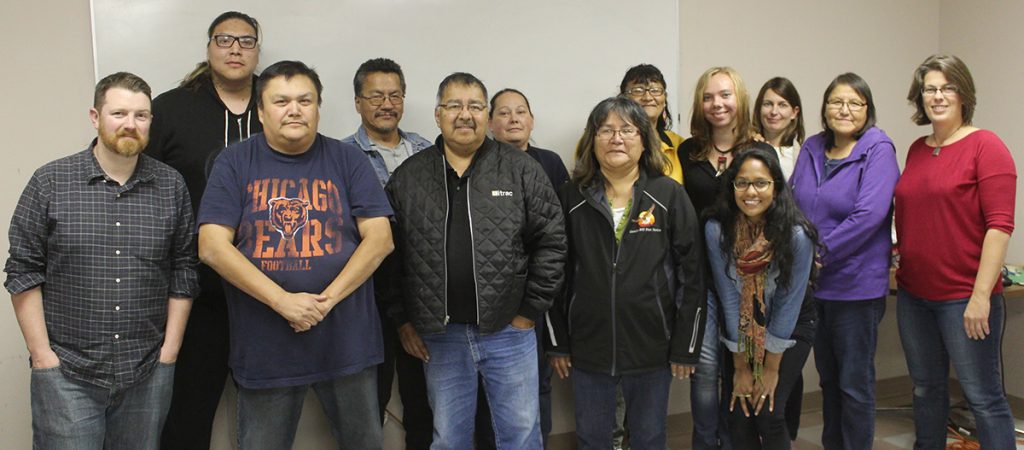
Some of my favourite memories from the trip centered on sharing food together, another important cultural practice that was an important feature of the Learning Trip and honestly, one that is a welcome departure from other work-related trips I have been on. We shared meals with almost everyone we met: from the community leadership to community members, fishermen to politicians—it is a beautiful practice that has this uncanny ability to shift power dynamics and foster open and honest communication. A simple act like sitting down and sharing food with someone adds a casual element to the conversation and it is over these meals that I heard some of the most powerful and impactful truths.
These meals would not have been possible without the tireless dedication of Ivan and Myra Harper, the local community healers and general adherents to traditional indigenous epistemologies. They are but one example of the generosity that seemed characteristic of the community. And yet, they seemed set apart by their tradition—surrounded by a world influenced heavily by modernity that feels disconnected from custom and heritage. Ivan made this painfully clear when he noted that we would be hard pressed to find someone without diabetes in any Garden Hill family; however he and his wife, who still eat largely a traditional foods diet, have escaped that seemingly inevitable fate for most of northern Manitoba’s First Nations people. Importantly, experts have found that this level of chronic diabetes is largely due to the changes in lifestyle brought about by colonization. The NMFCCF strives to support and encourage traditional practices as a critical pathway to reclaiming food sovereignty for indigenous nationhood.
The following morning was spent with two schools worth of Garden Hill’s children! There is nothing quite like the perspective of a child—so refreshingly honest and filled with promise. We asked them about their schools and their communities and they were eager to show us around and share their stories. When asked, one little boy spoke about gardening with his kokum and moshum and how it’s his favorite way to spend time with them. For such a young life, he was full of insight around why gardening is important and how it helps his family’s access to food, “my kokum says it’s good for you and it’s free”. Intergenerational knowledge transfer is another cornerstone of NMFCCF projects. Wherever possible, the collaborative likes to see youth engagement on food security projects because as we all know, the youth represent the hopes and dreams of a food secure nation.
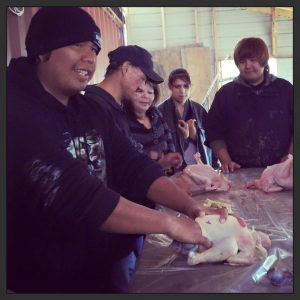 Next on the agenda was a visit to Meechim Inc., a social enterprise project that employs community members to locally produce vegetables, fruit and small livestock (chickens and turkeys). It was very clear from the moment you stepped onto the farm that there was an enormous amount of work carried out in a relatively short period of time. The monumental undertaking of clearing the brush for over 10 acres of land, while constructing a greenhouse and farmhouse from nothing, and also taking care of chickens, turkeys and weeds—seemed just staggering. And yet here I was, approximately 8 months after funding had been released, looking at incredible transformation of the abstract paperwork I complete in the south into the beautiful acreage before me. It was a profound moment for me personally as it was really the first time I could connect my work so directly to a community’s benefit. I think this is not an isolated incident for the members of the collaborative—the NMFCCF takes great care to ensure that dollars spent are tied to specific communities, names and faces. Reinforcing the human connection is one of the most important drivers for these learning trips and it serves a reciprocal learning function that is rare within the philanthropic world. I have yet to see the benefit of my work so clearly demonstrated at the community level in any other aspect of my professional career—it is one of my favourite parts about being on the collaborative.
Next on the agenda was a visit to Meechim Inc., a social enterprise project that employs community members to locally produce vegetables, fruit and small livestock (chickens and turkeys). It was very clear from the moment you stepped onto the farm that there was an enormous amount of work carried out in a relatively short period of time. The monumental undertaking of clearing the brush for over 10 acres of land, while constructing a greenhouse and farmhouse from nothing, and also taking care of chickens, turkeys and weeds—seemed just staggering. And yet here I was, approximately 8 months after funding had been released, looking at incredible transformation of the abstract paperwork I complete in the south into the beautiful acreage before me. It was a profound moment for me personally as it was really the first time I could connect my work so directly to a community’s benefit. I think this is not an isolated incident for the members of the collaborative—the NMFCCF takes great care to ensure that dollars spent are tied to specific communities, names and faces. Reinforcing the human connection is one of the most important drivers for these learning trips and it serves a reciprocal learning function that is rare within the philanthropic world. I have yet to see the benefit of my work so clearly demonstrated at the community level in any other aspect of my professional career—it is one of my favourite parts about being on the collaborative.
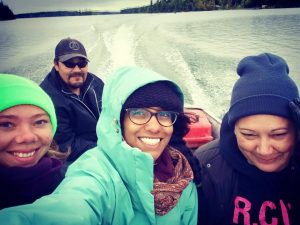 Last, but certainly not least, was a trip to visit the local commercial fishing plant. The plant itself had fallen into disrepair at the hands of vandals, but that mattered little to the group that was touring us around the facility. They spoke with clarity, purpose and vision about where the plant would be in one year and how it would impact the community for generations. We sat with the elders and knowledge keepers of traditional fishing practices to hear their stories, understand their challenges and celebrate their accomplishments. One of the most beautiful moments of this visit was watching the elder fishermen defer to their sons and nephews, the next generation of traditional fishermen that they are raising through this project, to show us southerners how to set a fishing net.
Last, but certainly not least, was a trip to visit the local commercial fishing plant. The plant itself had fallen into disrepair at the hands of vandals, but that mattered little to the group that was touring us around the facility. They spoke with clarity, purpose and vision about where the plant would be in one year and how it would impact the community for generations. We sat with the elders and knowledge keepers of traditional fishing practices to hear their stories, understand their challenges and celebrate their accomplishments. One of the most beautiful moments of this visit was watching the elder fishermen defer to their sons and nephews, the next generation of traditional fishermen that they are raising through this project, to show us southerners how to set a fishing net.
The trip left me feeling a distinct fullness in my heart and truly my whole experience of being part of the collaborative has left me feeling this way. I was so honoured to have met and spent time with the community of Garden Hill and I am so proud of what they have accomplished so far. I am also grateful for the opportunity to connect with colleagues from across the country, to get to know their stories too. Community Economic Development work can be discouraging and at times, lonely. Being part of the collaborative allows for such a more robust experience of philanthropy and I am grateful to have shared these memories with some wonderful people, all trying to make a difference in our little northern corner of the world.
Learn more about the Northern Manitoba Food, Culture, and Community Fund.
